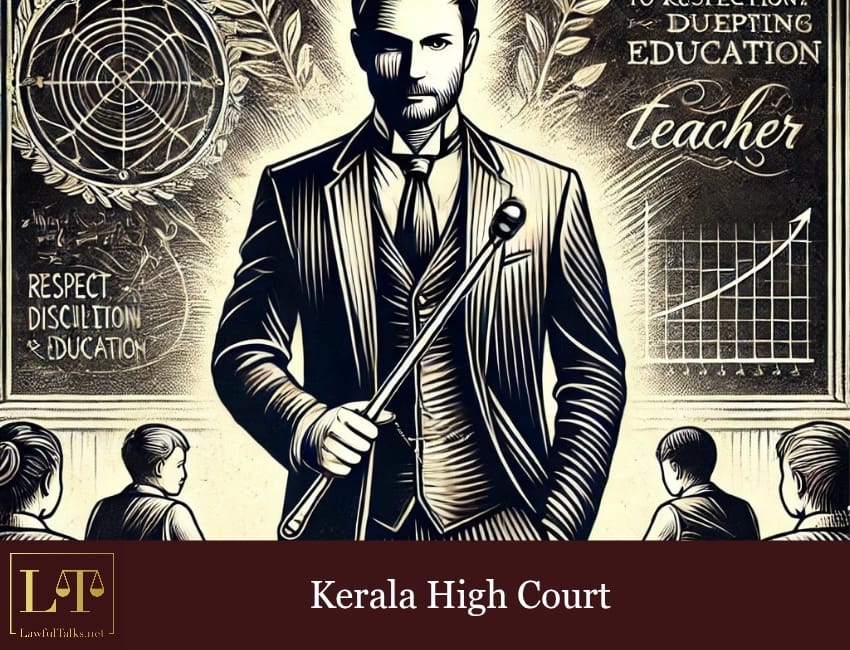Allahabad HC Sets Aside Afzal Ansari's Conviction, Allows Him to Continue as MP

Granting relief in the form of bail to a teacher accused of assaulting a 6th standard student with a cane, Justice P.V. Kunhikrishnan of the Kerala HC, emphasised that a preliminary enquiry is necessary before registering any criminal case against a teacher in connection with his/her actions in the educational institutions to maintain the discipline, good behaviour, etc, of their students in academic institutions.

Justice P.V. Kunhikrishnan emphasized that teachers should not face legal action for minor punishments given in good faith and ordered the State Police Chief to issue a circular enforcing this within a month. The court noted the increasing number of criminal cases against teachers due to students’ and parents' complaints regarding discipline.
The petitioner in the instant case is a teacher who was facing criminal prosecution alleging offenses punishable under Section 118(1) of BNSS—voluntarily causing hurt or grievous hurt by dangerous weapons and Section 75 of the Juvenile Justice Act, 2015—punishment for cruelty to a child.
The prosecution argued that the petitioner summoned the son of the de facto complainant, a student in the 6th standard, and assaulted him with a cane.
The alleged motive was enmity arising from the claim that the child had informed other students about the death of the petitioner's son in an accident caused by the petitioner while driving.
Denying the prosecution's arguments, the petitioner submitted that he always advised the victim student to study well, but the victim was lazy in academic studies.
The constant advice was not taken too well by the student, who then spread the news to the other student that the petitioner was responsible for the death of the petitioner's son. The petitioner stated that as a teacher he only tried to correct the student, and his act was not intentional.
Hearing both averments the court stressed that teachers play a critical role in shaping students’ behavior and there should be no fear of prosecution for reasonable disciplinary actions.
“Nowadays, the teachers in the schools are reluctant to take any risk as far as their students' behaviour, discipline etc are concerned. They believe that, even if they act bonafide, there is a threat of registration of criminal case against them. In the olden days, the strict discipline of teachers benefited the student community in shaping their lives.”
“Even when a student is pinched or pushed or poked without any malice, criminal cases are registered against the teachers, based on the complaint of the parents/ students. This should be stopped. Otherwise, the teachers cannot do their duties. Therefore, I am of the considered opinion that if a parent or student files any complaint against a teacher alleging any criminal offence committed inside an educational institution, a preliminary enquiry should be conducted to ascertain whether there exists a prima facie case for proceeding with the matter.”
The court cited that before filing a case for complaints against a teacher for their actions within an educational institution, a preliminary investigation must be carried out in accordance with Section 173(3). Under Section 173(3) of the BNSS, the police may carry out a preliminary investigation to determine whether a prima facie case exists for offenses punished by three years or more but less than seven years, added the court.
A notice also can be given to the teacher, if necessary, for conducting the preliminary inquiry, but he shall not be arrested during the period of preliminary inquiry, stated the bench.
Considering that the maximum punishment for these offenses is three to five years, the court granted conditional bail, stating that many teachers avoid taking disciplinary action due to the fear of criminal prosecution:
“In the olden days, the strict discipline of teachers benefited the student community in shaping their lives.”
The court emphasized that once a child is admitted to a school, parents entrust teachers with their education, discipline, and overall development, warning that the lack of authority for teachers could lead to a decline in academic standards and student behavior.
The court suggested that teachers be allowed to carry canes as a symbol of authority, even if not used for corporal punishment:
“Let the teachers carry a cane in their hand while they are in educational institutions, if they intend to do so. It need not be used always, but the mere presence of a cane will create a psychological effect in the student community by discouraging them from doing any social evils.”
In conclusion, the court released him on bail after imposing stringent conditions, observing that the maximum punishment for the charges alleged against him is three and five years.
Case Title: Sibin S. V. vs. State of Kerala Bail Appl. No. 2937 of 2025
Advocate For Petitioners: Advocates M. R. Sarin
Advocate For Respondent: Noushad K. A. (PP)






























































































































































































































































































































































































































































































































































































































































































































































